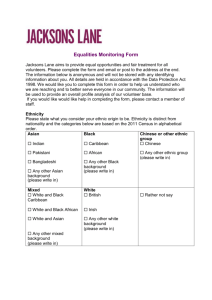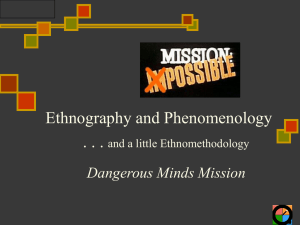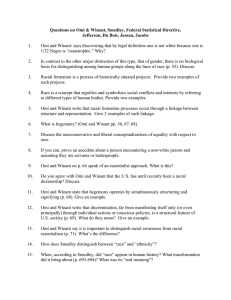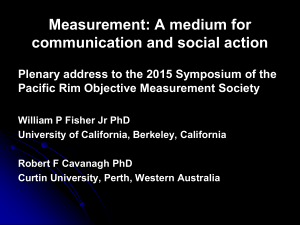Community: Experience, Context, and Perspective
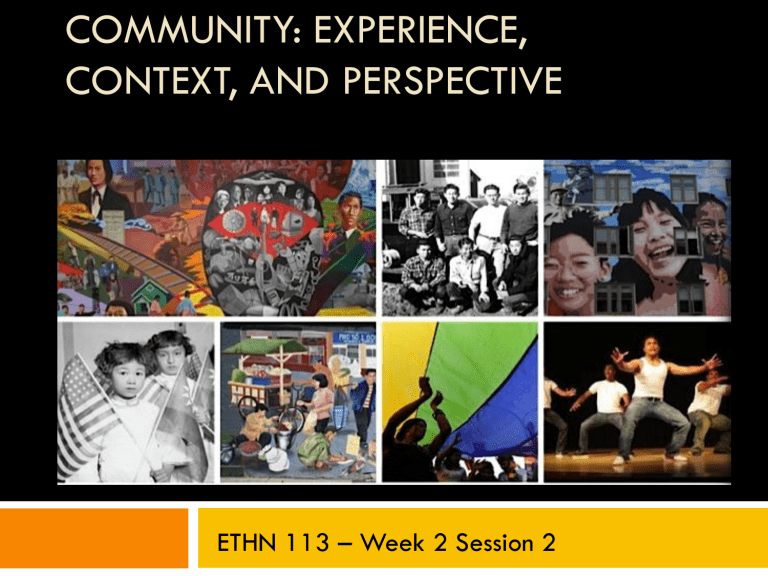
COMMUNITY: EXPERIENCE,
CONTEXT, AND PERSPECTIVE
ETHN 113 – Week 2 Session 2
Last Session
Discussed the emergence of the terms “Asian
American” and “Asian and Pacific Islander
American” by (1) synthesizing key ideas from Omi and Winant’s work on “racial formation” and (2)
Fong’s chapter on the history of Asian and Pacific
Islander Americans.
Synthesizing Omi and Winant and
Fong
Omi and
Winant’s
“Racialization”
Fong’s Ch.1:
History of Asian
Americans
Race and ethnicity as a process
Race and ethnicity as historical and social concept
Critique of static scientific ideas of race
Various groups identify as API because of similar experiences, particularly political.
Asian Americans as a Racialized
Group
Today
Examine the philosophical origins of the term
“experience” as it relates to race and community by
(1) holding a discussion on race and space, (2) discussing phenomenology
Historical Events and Social
Movements
World War II
Civil Rights
Movement
War in Southeast
Asia
Free Speech
Movement
Emergence of
Ethnic Studies
Change Curriculum
Diversify faculty
Service to vulnerable populations
“Community”
Theory, research, and practice centered on the
“experience” of marginalized peoples
Pair-Share Activity
Discuss a community that has impacted your life.
How would your life be different if you weren’t part of that community?
Reflecting on “Community”
Types of communities that have shaped our and our classmates’ development:
Recreation – sports, arts, etc.
Workplace
Military
Online sites
Schools, universities, classes
Religious
Ethnic
Regions, cities, towns, neighborhoods, apartment complexes
Age or peer group
Family
What these various communities have in common:
Collection of people
Common beliefs, values, goals, traditions
People play roles
Place (spaces of interaction, physical and imagined)
What distinguishes communities from one another:
Boundaries
Demographics
Membership
Interests
Values
Traditions
Rituals
Key Question:
How and why do we study communities?
The “Project” of Ethnic Studies
Ethnic Studies is interdisciplinary. It borrows from numerous disciplines.
Concerned with theories and practices that address questions of power, social movement, freedom, liberation, community, culture, and history.
Our course focuses on three “tools” that are central to this project: (1) experience, (2) context, and (3) perspective. These tools are rooted critical philosophical thought.
Philosophical Roots of Experience,
Context, and Perspective
Experience, context, and perspective are ideas that are derivative of phenomenology, one of five fields of philosophy.
Ontology is the study of beings or their being — what is.
Epistemology is the study of knowledge — how we know.
Logic is the study of valid reasoning — how to reason.
Ethics is the study of right and wrong — how we should act.
Phenomenology is the study of our experience — how we experience.
Phenomenology
Phenomenology studies structures of conscious experience as experienced from the first-person point of view, along with relevant conditions of experience.
The central structure of an experience is its intentionality, the way it is directed through its content or meaning toward a certain object in the world.
Phenomenology is concerned with:
the appearances of things things as they appear in our experience or the ways we experience things, thus the meanings things have in our experience.
(1) Experience
In their work on these projects, scholars in ethnic studies and related fields often ground their thinking in ideas related to “experience.”
Common views on “experience” often focus on the collection of memories or lessons learned from the past.
Accumulation of skills (i.e. work experience)
Experience from a Phenomenological
Perspective
Experiences are not only sensory (what you see, smell, feel, and taste).
Experiences are related to intentionality – what are the purposes of the social engagement.
Experiences are situated in contexts. That is, they are shaped by the social environment.
Experiences are socially constructed.
(2) Context
A major assumption proposed in this class is that experience is inextricably tied to context.
Context shapes experience and experience shapes context.
In the 1970s and 80s, scholars of human development voiced the need for going beyond the individual as the unit of analysis to the notion of
“context.”
Urie Brofenbrenner (Cornell)
Psychologist
Co-founder of the Federal Head Start program.
Pre-school for disadvantaged students
Developed the Ecological Systems Theory
Provides a heuristic or framework for thinking about the various communities or contexts that shape our development.
Context from an Education Perspective
An Ethnic Studies Inspired View of
Context
We are focusing on an interdisciplinary approach to contexts. We are focusing on four dimensions of social contexts: power, structure, identity, and culture.
Power/Resistance
Overt and Covert control
Structure
Institutions and patterns of social interaction
Culture
Bounded system of values and traditions shared by a group
Identity
How groups and individuals see themselves and are seen by “others”
Community as Context
Scholars often focus on “community” as a unit of analysis for understanding dimensions of the human experience.
In ethnic studies, community is an important construct because it helps bring into perspective matters of inequality, particularly as it relates to processes of inclusion and exclusion.
(3) Perspective
Because individuals and groups are situated differently in social contexts with regards to power, culture, identity, and structure understanding one’s own position is important.
Reflexivity – situating ourselves in the social context to understand our and other’s positions.
We are interested in the interplay between subjects and objects. Therefore, we look at social phenomenon from an intersubjective perspective.
Objectification is a crucial component of justifying or rationalizing violence against “others.”
Next Sessions
Week 2 Online Session
Watch the first two chapters of the Frontline video, “A
Class Divided”
Read Amy Tan’s essay, “Mother Tongue”
Blog about these materials (one entry)
In your Welcome page, after your bio, discuss three or more communities that have shaped your life.
Preparation for Next Tuesday
Blog on Fong, Ch. 6

